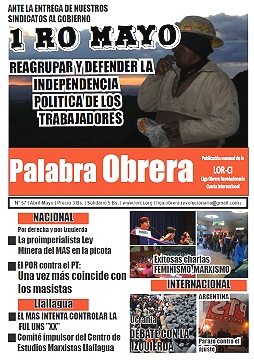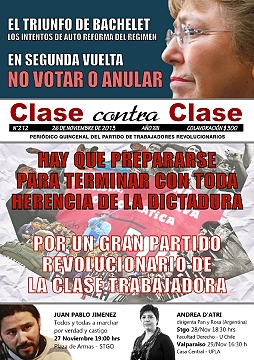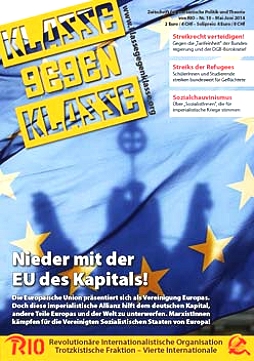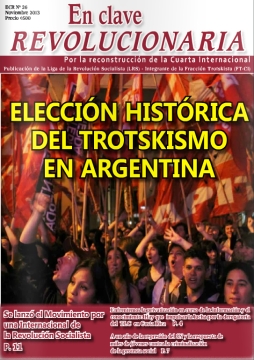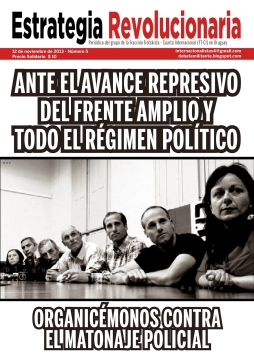Venezuela
Four Questions about Chávez Project
19/03/2007 La Verdad Obrera N° 226
Hugo Chávez raised his voice against Bush from the platform in the
Ferro Stadium that Kirchner’s government prepared for him. His speech
was broadcast to millions on TV and confirmed the great popularity
that the President of Venezuela enjoys in Argentina and the rest of
the continent. Chávez won this popularity with a speech focused
against US imperialism and invoking, as he did last Friday in Ferro,
taking advantage of Bush’s visit to Uruguay, the tradition of the
anti-imperialist feats of the continent, from Sandino to Che Guevara,
mixed with praise for Juan Domingo Perón, for the occasion. Hugo
Chávez is capitalizing, in part, on the bad reputation of the US
government among the masses, and the lukewarmness, when it is not
direct submission, of the rest of the Latin American Presidents who
are called "progressives."
However, Kirchner’s supporters themselves, like the pollster Artemio
López, of the consulting firm Equis for the governing party, recognize
that Chávez is the "Latin American leader that best managed to
construct the image of a social redeemer, independently of the
complex social reality of his country and of his own management."
Finally, what he says is one thing, and what he does is another.
– 1 How is the national income distributed in Venezuela?
The reality is that poverty continues to strike nearly 40% of the
population of Venezuela, neither more nor less than the average
percentage of poverty throughout the countries of Latin America and
the Caribbean. Unemployment affects 10.5% of the workers, more than a
million Venezuelans, and unemployment among youth reaches 23%. This is
not happening because Venezuela is going through an economic crisis,
on the contrary. The Venezuelan economy has experienced strong growth
in the last three years and has currency reserves of more then
$35 billion, the biggest in its history, thanks to the price of
the oil it is exporting, which last year reached nearly $60 a barrel.
It is notable that in 2002 workers’ wages were 33% of the national
income, and in 2005 they fell to 25%. However, the income of
businessmen rose from 38% to 49% of total national income. That is, in
the Venezuela of Chávez, in the last three to four years, there was a
regressive distribution of the national income. Businessmen went from
a third, to take half the pie, and millions of workers took only a
fourth. It’s a bigger pie, but the lion’s share of growth went into
the pockets of the exploiters. Businessmen with foreign, mainly US,
capital, were especially favored. And in second place, employers
connected to state businesses and their "mixed" enterprises with that
foreign capital, junior partners, chavista businessmen. This is the
secret of the "reconstruction of the national bourgeoisie," promoted
at the expense of the workers.
The only progressive distribution of income took place mainly through
the so-called Missions, big state assistance plans, that have
moderated poverty without eliminating it, but not through a wages and
jobs policy that would favor the workers, who are suffering the
chronic evils of capitalism, unemployment and the high cost of living,
which is serious in Venezuela, with 17% inflation, the highest rate on
the continent.
The program of real socialism is the opposite: the sliding scale of
wages and hours of work. The sliding scale of wages means that
contracts must insure an automatic increase in wages in correlation
with a rise in the price of articles of consumption. And the sliding
scale of hours of work means that the existing work is shared among
all available hands, and this is how the length of the work week is
determined, while wages, with a strictly assured minimum, follow the
movement of prices.
– 2 What is Chávez doing with oil and the strategic sectors of the economy?
The project of Chávez is based on mixed enterprises, associations
between the state and foreign capital that continue to dominate
Venezuela. What was recently presented as "nationalizations," was
really the purchase at market price of stocks of US enterprises that
for years have been enjoying profits from the telephone and
electricity utilities, for which Chávez paid out $1,5 billion US. If these
stocks fall in the crisis that stock markets in the whole world are
experiencing, then Venezuela will share in the losses. Losses are the only thing
that is "socialized" under capitalism.
Unlike twentieth-century bourgeois nationalism, like that of General
C�rdenas in Mexico, who expropriated 17 foreign companies in the year
1938, with nearly symbolic [very small] compensation and provoked
hostility from Britain and other world powers, Chávez has received
only praise from the managers of foreign capital. The formation of
mixed enterprises has meant that the big oil companies like Shell or
Chevron-Texaco continue to own 49% of the oil and the installations of
the oilfields, where they are now operating with agreements with the
state oil company PDVSA. Sean Rooney, the manager of Shell in
Venezuela, said, in support of the creation of mixed enterprises,
"being a partner is very different from rendering a service."
For its part, the Venezuelan state’s participation in the strategic
enterprises cannot be called an improvement for the working class and
the poor, but serves to open more big deals. This explains the
relations Chávez has with [Argentinean Planning] Minister [Julio] De
Vido and his capitalist friends in building works in Venezuela, or the
deals of the "Argentinean business class," ranging from the big
businessmen like Paolo Roca of Techint to the small pirates like
Sergio Taselli, the pro-Kirchner [President of Argentina] businessman
who privatized Río Turbio and is the culprit in the mining tragedy [of
R�o Turbio, southern Argentina, in June, 2004, where 14 miners died],
who plans to sell elevators for hospitals in Venezuela. Is this the
"Latin American union?"
Against the alliance between foreign and Venezuelan capital, that
favor Chávez’s "mixed enterprises," workers need the expropriation of
the national resources without payment and under workers’ control.
Recently, a big march of thousands of workers in Caracas asserted this
perspective, by demanding "nationalizations without payment." On the
basis of expropriation, direct administration of the oil industry and
the main springs of the economy by workers would permit allocation of
everything that is needed to meet the vital demands of millions of
workers, campesinos and the poor, and would indeed mean a real school
of socialist planning. In contrast, the project of Chávez’s
"Bolivarian revolution" is, in reality, that of preserving a
semi-colonial capitalist structure, which causes the enormous social
inequality that survives in Venezuela.
– 3 What political instrument is Chávez proposing?
Chávez proposes that the workers share a common party with the
national bourgeoisie, the aggravating factor being that while that
bourgeoisie gets its dividends as a junior partner of foreign capital,
the working class gets nothing by associating itself with the
Venezuelan bourgeoisie. On the contrary, a party shared with "the
nationalist businessmen," as Chávez calls them, means doing away with
the independence and energies of the only social force capable of
consistently opposing imperialism, the more than 10 million Venezuelan
workers. Together with the poor, the workers are the ones who created
the real army that with the mobilization in the streets defeated the
attempt at a coup d’etat that foreign capital promoted in April 2002
as well as the rich reactionaries. The need for the workers to be
independent of the project of Chávez is clear, once again, from the
workers’ own experience: only a party belonging to the working class
that can lead all the poor of city and countryside can end the threats
of a coup from those who are now keeping their heads down and taking
advantage of the moment of economic bonanza to make their deals. When
the crisis of capitalism that is predicted by the crisis of the stock
markets hits Venezuela, the counter-revolution will raise its head
again. An independent party of the workers will mobilize all the
forces to defeat the coup-plotting reactionaries once and for all,
using working-class methods, by creating workers’ militias, occupying
the factories and enterprises and establishing workers’ control there,
promoting the seizure of lands from the big landowners, in alliance
with impoverished campesinos. That is, the independent workers’ party
will cut the jugular that supplies the material forces of the
reactionaries: their ownership of the big means of production.
In contrast, the project of Chávez means conciliating the
reactionaries while he seeks to discipline the working class and all
its tendencies in a single party together with the national business
class, a party that is named, contrary to all reality, Partido
"Socialista" Unificado de Venezuela (PSUV) ["united `socialist’ party
of Venezuela"].
Not just in Venezuela, but throughout the continent, workers need to
conquer their own political independence as a class, their own
political parties, absolutely separated from the Latin American
bourgeoisies. Setting up powerful political instruments that can
release the strength of the most numerous and productive class in
society, parties in which we fight for a revolutionary program on the
way to workers’ power, to overcome experiences like that of the PT in
Brazil that arose in the 1980s with a program of reforms and ended up,
with Lula in power, as a docile instrument of capitalism.
– 4 "Socialism" with businessmen?
Hugo Chávez has said that his project can be defined as "Twenty-first
Century Socialism." "Socialism," says Chávez’s, "is the way because
capitalism, which is in crisis, is a means of social control. It is a
dictatorship by the elites: a minority rises economically, and the
majority is impoverished. If there is democracy, the poor, who form an
excluded majority that will ask for its rights, asserts itself. Then
powerful elites will object, even violently. Therefore, capitalism and
democracy cannot go together. But, just as we do not want capitalist
dictatorship, neither do we want the proletarian dictatorship Marx
talked about. We want democracy, socialism."
What is certain is that Venezuelan democracy, where elections in which
"the impoverished majority" vote repeatedly for Chávez, but in which
the one who decides is effectively the President, who holds "special
powers," has not enabled these majorities to change their situation
qualitatively during 8 years of "Bolivarian revolution," nor even in
the last three years of economic growth. This happens, not only in
Venezuela, but in all the semi-colonial countries of the continent.
The capitalist regime causes poverty, not because it is against the
holding of elections, but because a minority class is seizing social
wealth for itself. This is the real "dictatorship" that reigns in
Latin America; opposed to that of Marx, where majorities exercise
their "dictatorship" over an exploiting minority (for that reason, it
is qualitatively more democratic), and in which the masses equip
themselves with their own organs of self-government, like the Paris
Commune or the soviets of the Russian Revolution.
In contrast, this "socialism" of Chávez denies the need to abolish
private ownership of the big means of production and exchange; and
therefore it denies the need for a series of victorious revolutions in
the region that can end domination and exploitation by imperialist
capital and national bourgeoisies.
"Socialism with businessmen," more accurately, with exploiters, is the
negation of socialism. Only a workers’ and campesinos’ government,
based on organs of direct democracy with freedom for all workers’ and
revolutionary tendencies, is the only government that can begin the
real perspective of socialism, not the "single party" of "socialism
with businessmen" that Chávez is using. The allies of the workers
cannot be these current governments that Chávez calls on to lead the
"Latin American union." It is the powerful working class of the
continent, together with the impoverished campesinos and the masses
that, through their own governments, can head for genuine unity in a
Federation of Socialist Republics of Latin America, that can overcome
the borders imposed by the national capitalists and imperialism.
Socialism is the historical project of the exploited, because it is
based precisely on doing away with all exploitation.
*Translation revised by Robert Kaplan








